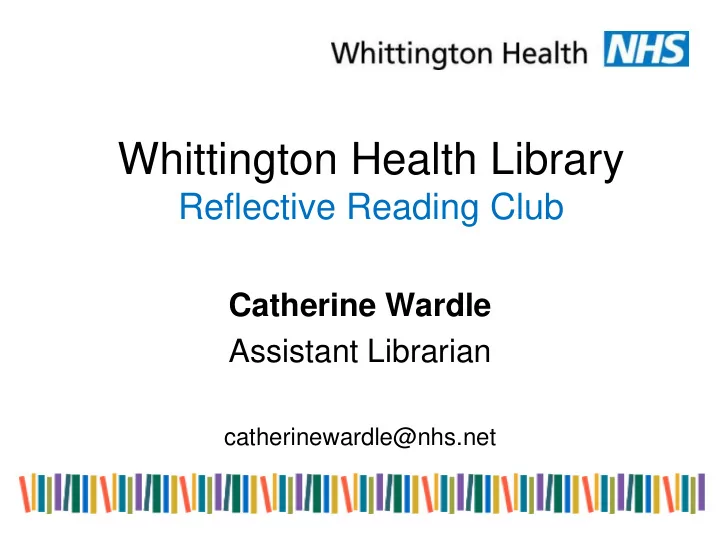

Whittington Health Library Reflective Reading Club Catherine Wardle Assistant Librarian catherinewardle@nhs.net
Revalidation – what you need to do • As a professional, you have a duty to keep your professional knowledge and skills up to date through a continuous process of learning and reflection. • NMC revalidation requires that each nurse/midwife must complete 35 hours of CPD in the 3 years since last revalidating. This club, plus the preparatory reading, would constitute 3 hours of CPD time. • That’s 1.5 individual and 1.5 participatory learning Useful Websites The NMC’s revalidation website: Click Here The Nursing Times ‘Revalidation Zone’: Click Here The RCN’s website section on revalidation: Click Here The RCM’s website section on revalidation: Click Here
This session can also provide you with a written reflective account! The requirement (see Guidance) Section 52. You must have prepared five written reflective accounts in the three year period since your registration was last renewed or you joined the register. Each reflective account must be recorded on the approved form and must refer to: • an instance of your CPD and/or • a piece of practice-related feedback you have received and/or • an event or experience in your own professional practice and how this relates to the Code. The purpose of this requirement We want to encourage nurses and midwives to engage in reflective practice so that they identify any changes or improvements they can make to their practice based on what they have learnt. This requirement should also raise awareness of the Code and encourage nurses and midwives to consider the role of the Code in their practice and professional development. How to meet the requirement Each reflective account can be about an instance of CPD, feedback, an event or experience in your practice as a nurse or midwife, or a combination of these. For example, you could create a reflective account on a particular topic which may have arisen through some feedback your team received following an event, such as consent and confidentiality and identify how that relates to the Code. - http://www.nmc.org.uk/standards/revalidation/how-to-revalidate/
Critical reflection – what is it? “Critical reflection goes beyond the simple recollection and description of events that usually characterize our everyday reflections, and involves some kind of analysis of the meanings and implications of what we are reflecting on .” “Is the capacity to reflect on action so as to engage in a process of continuous learning . It can support professional competency and professional development and is a self-critical form of reflection that can be used to gain insights and assess one’s own thoughts and behaviours ” (Critical Reflection in Practice, 2011) Reflective reading – is the process of reflection when reading, assessing and potentially applying what you’ve read into clinical practice. (Using reflection on reading for revalidation. Nursing Times - June 2015)
Useful resources Articles T o order copies of these articles, use the ‘Request an article’ form on our website. Free and unlimited service. • A new model of reflection for clinical practice Barksby, J., Butcher, N. & Whysall, A. (2015) Nursing Times , 111 (34- 35), p. 21-23. • Using reflection on reading for revalidation Collins, G. et al (2015) Nursing Times , 111 (23-24), p. 14-16. • Communication skills and enhancing clinical practice through reflective learning: a case study Tregoning,C. (2015) British Journal of Healthcare Assistants , 9 (2), p. 66-69. • Written communication: from staff nurse to nurse consultant. Part 6: reflective writing Fowler, J. (2014) British Journal of Nursing , 23( 20) p. 1092. • Reflection: from staff nurse to nurse consultant. Part 3: ways to aid reflection? Fowler, J. (2014) British Journal of Nursing , 23 (5), p. 289. Websites The following are freely available on the internet - you do not need a username and password to access them. • A guide from Oxford Brookes University on reflective writing: Click Here • University of Cumbria’s guide to reflective writing, including examples of models of reflection: Click Here • A guide to keeping a reflective journal from the RCM: Click Here
Recommend
More recommend